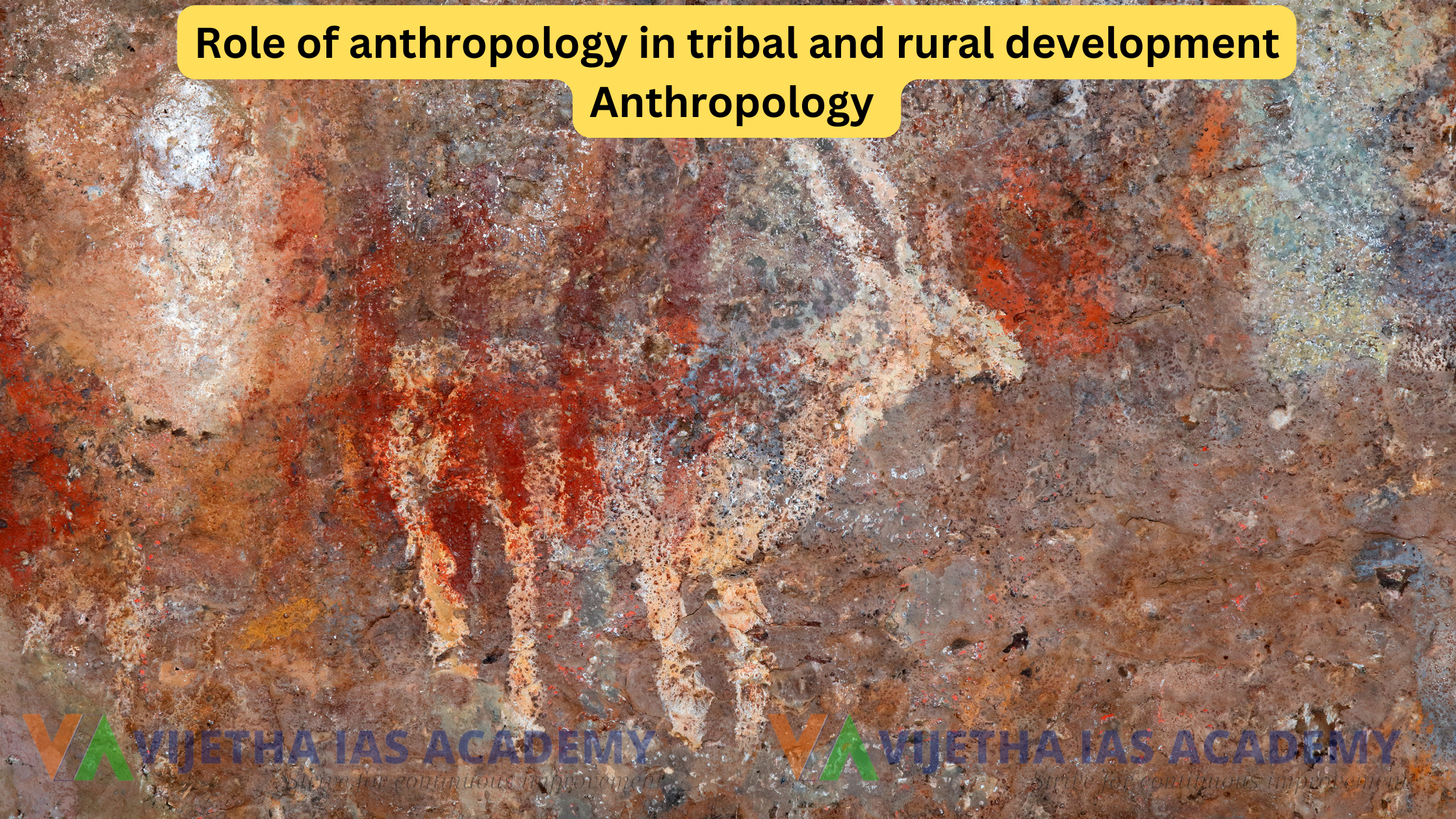
The Role of Anthropology in Tribal and Rural Development A Comprehensive Guide for UPSC Aspirants
Anthropology, the holistic study of humans, plays a crucial role in understanding and addressing the complexities of tribal and rural development. For UPSC aspirants opting for Anthropology Optional, grasping the significance of anthropology in this context is essential. This article explores the role of anthropology in tribal and rural development, providing valuable insights and practical knowledge to aid in your preparation. To further enhance your understanding, consider the resources and guidance available at Vijetha IAS Academy, particularly the expertise of Kishore sir Anthropology.
Understanding Anthropology and Its Relevance
Anthropology, as a discipline, delves into the cultural, social, economic, and biological aspects of human life. It offers a comprehensive understanding of human societies, their development, and their interactions with the environment. In the context of tribal and rural development, anthropology provides valuable insights into the unique challenges and opportunities faced by these communities.
Anthropological Perspective:
- Studies cultural practices, social structures, and economic systems of tribal and rural communities.
- Analyzes the impact of external factors, such as modernization and globalization, on these communities.
Anthropology's Contribution to Tribal Development
Understanding Tribal Societies
Anthropologists conduct extensive fieldwork to understand the cultural practices, social organization, and belief systems of tribal communities. This deep understanding is essential for designing and implementing effective development programmes.
Anthropological Perspective:
- Examines traditional governance structures and their role in tribal society.
- Analyzes the impact of cultural practices on social cohesion and community resilience.
Participatory Development Approaches
Anthropology advocates for participatory development approaches, which involve tribal communities in the planning, implementation, and evaluation of development projects. This ensures that the programmes are culturally appropriate and address the actual needs of the community.
Anthropological Perspective:
- Studies the effectiveness of participatory approaches in tribal development.
- Analyzes the challenges and successes of involving tribal communities in development processes.
Addressing Land and Resource Rights
Land and resource rights are critical issues for tribal communities. Anthropologists work to document traditional land use practices and advocate for the recognition of these rights in legal and policy frameworks.
Anthropological Perspective:
- Examines the impact of land and resource policies on tribal livelihoods.
- Analyzes the role of anthropology in advocating for land rights and environmental justice.
Health and Education Initiatives
Anthropologists contribute to the design and implementation of health and education initiatives that are culturally sensitive and accessible to tribal communities. This includes understanding traditional health practices and integrating them with modern healthcare systems.
Anthropological Perspective:
- Studies the impact of health and education programmes on tribal communities.
- Analyzes the challenges in ensuring access to quality health and education services.
Anthropology's Contribution to Rural Development
Understanding Rural Societies
Rural communities have distinct socio-economic structures and cultural practices. Anthropologists conduct ethnographic studies to understand these dynamics, which is essential for effective rural development planning.
Anthropological Perspective:
- Examines the social organization and economic activities of rural communities.
- Analyzes the impact of external factors on rural livelihoods.
Sustainable Livelihood Approaches
Anthropology emphasizes sustainable livelihood approaches that consider the long-term well-being of rural communities. This includes promoting agricultural practices that are environmentally sustainable and economically viable.
Anthropological Perspective:
- Studies the impact of sustainable livelihood programmes on rural development.
- Analyzes the challenges and successes of implementing sustainable practices.
Gender and Development
Anthropologists pay close attention to gender dynamics within rural communities. Understanding the roles and contributions of women in rural economies is crucial for designing inclusive development programmes.
Anthropological Perspective:
- Examines the impact of gender-focused development initiatives.
- Analyzes the challenges in promoting gender equality in rural development.
Infrastructure and Social Services
Access to infrastructure and social services, such as water, sanitation, and healthcare, is critical for rural development. Anthropologists work to understand the specific needs and constraints of rural communities to ensure that development programmes are effective and sustainable.
Anthropological Perspective:
- Studies the impact of infrastructure and social service programmes on rural communities.
- Analyzes the challenges in ensuring access to essential services.
Case Studies
The Bhil Community
The Bhil community, one of the largest tribal groups in India, has been the focus of various anthropological studies. These studies have provided valuable insights into the cultural practices, social structures, and economic activities of the Bhils, informing development programmes aimed at improving their livelihoods.
Anthropological Perspective:
- Examines the impact of development programmes on the Bhil community.
- Analyzes the efforts to balance cultural preservation with socio-economic development.
The Gonds of Central India
The Gonds, a major tribal group in central India, have faced issues related to land rights, forest policies, and cultural assimilation. Anthropological studies have highlighted the need for culturally appropriate development interventions that address these challenges.
Anthropological Perspective:
- Examines the impact of land and forest policies on Gond livelihoods.
- Analyzes the role of anthropology in promoting culturally appropriate development.
Rural Communities in Andhra Pradesh
Anthropologists have conducted extensive studies on rural communities in Andhra Pradesh, focusing on agricultural practices, social organization, and the impact of development programmes. These studies have informed policies aimed at promoting sustainable agriculture and improving rural livelihoods.
Anthropological Perspective:
- Studies the impact of agricultural development programmes on rural communities.
- Analyzes the challenges in promoting sustainable agricultural practices.
Anthropological Insights for UPSC Aspirants
For UPSC aspirants, understanding the role of anthropology in tribal and rural development is crucial for Anthropology Optional. It involves analyzing the cultural, social, and economic dimensions of development and applying this knowledge to design and evaluate development programmes.
Key Areas of Study
- Cultural Practices: Understanding the cultural practices and social organization of tribal and rural communities.
- Participatory Approaches: Evaluating the effectiveness of participatory development approaches.
- Land and Resource Rights: Analyzing the impact of land and resource policies on livelihoods.
- Health and Education: Understanding the challenges in providing health and education services.
- Sustainable Livelihoods: Promoting sustainable agricultural practices and economic activities.
- Gender and Development: Addressing gender dynamics in development programmes.
- Infrastructure and Services: Ensuring access to essential infrastructure and social services.
Preparation Resources
Aspirants can enhance their preparation with resources from Vijetha IAS Academy, which offers specialized courses tailored for Anthropology Optional. The academy's comprehensive study material and expert faculty, including Kishore sir Anthropology, provide invaluable support for thorough preparation.
Conclusion
The study of anthropology offers valuable insights into the complexities of tribal and rural development. For UPSC aspirants, mastering this topic within the Anthropology Optional syllabus is essential for a well-rounded preparation.
By leveraging resources like Vijetha IAS Academy and the expert guidance of Kishore sir Anthropology, aspirants can develop a comprehensive understanding of the role of anthropology in development. This knowledge will not only aid in their UPSC preparation but also equip them to contribute meaningfully to the discourse on tribal and rural development, social justice, and sustainable livelihoods.

